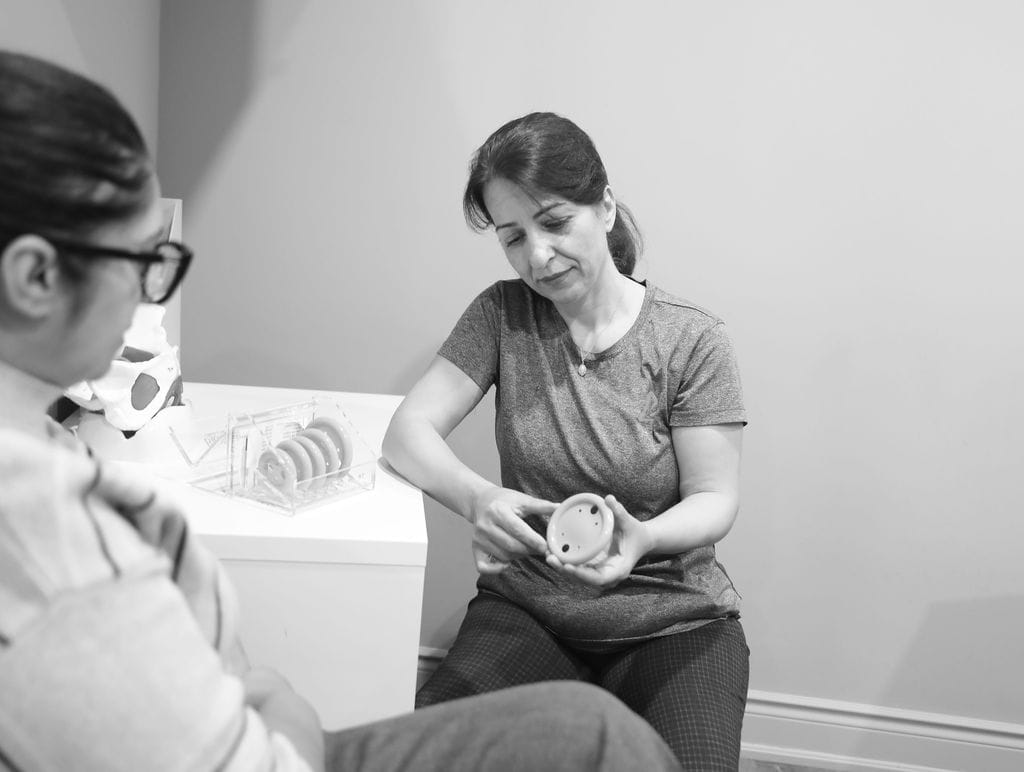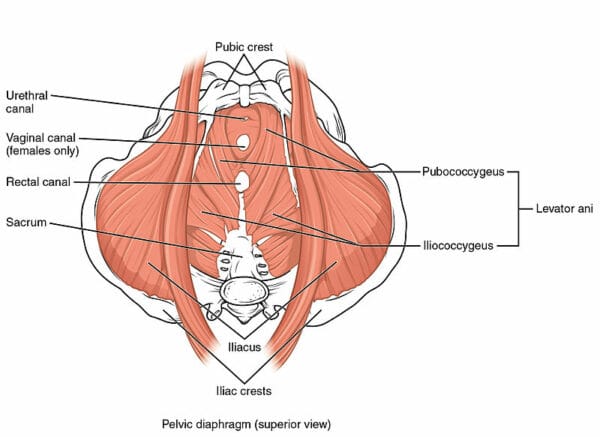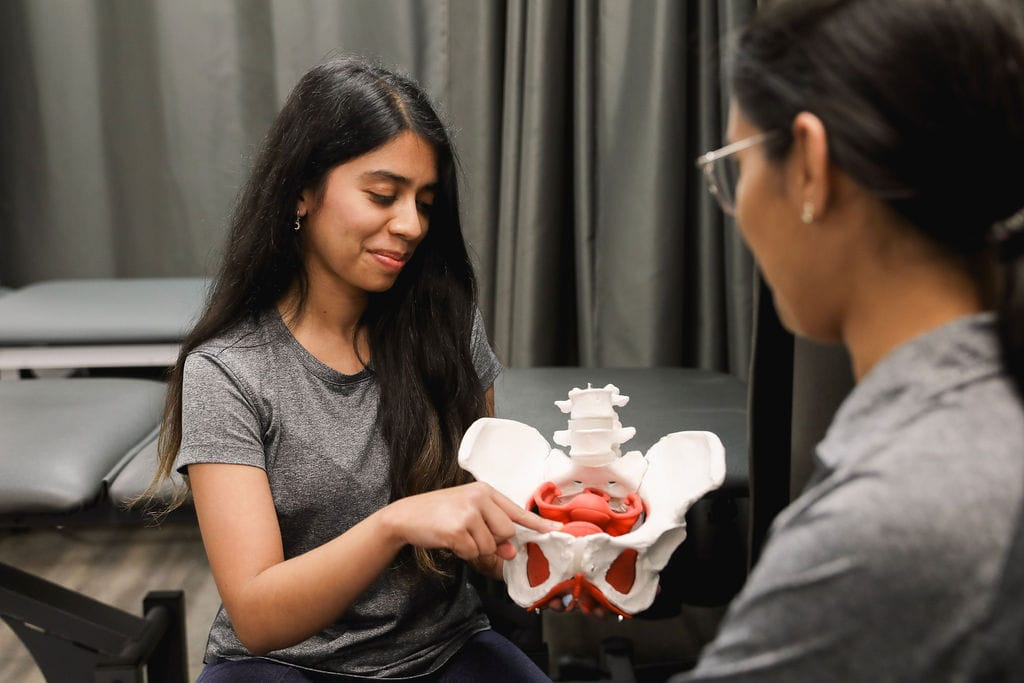Written by Roshni Ravi, Pelvic Health Physiotherapist.
Sexual health is an important aspect of overall health and well-being, but it’s not always an easy topic to talk about. Many women experience sexual health dysfunctions at some point in their lives, but they may feel embarrassed or ashamed to seek help by way of pelvic floor physiotherapy. There are currently large gaps in the sexual education provided at the elementary school level. Many sex ed classes are focused on birth control and how terrible periods are.
But there is not enough information, if any, on sexual health conditions and how to seek help. We’ve had a lot of conversations with patients about what they wish they had learned in sex-ed. In this blog post, we’ll explore some of the most commonly asked questions about sexual health dysfunctions in women and offer some tips for managing them.
What is pelvic floor physiotherapy?

Pelvic floor physiotherapy focuses on treating the muscles, ligaments, and connective tissues of the pelvic floor which is a group of muscles that form a supportive hammock-like structure at the base of the pelvis. They play a key role in maintaining continence, supporting the pelvic organs, and providing stability to the spine and hips.
Pelvic floor physiotherapy involves a range of exercises, manual therapy techniques, and education to help individuals with pelvic floor dysfunction. Common conditions that may benefit from pelvic floor physiotherapy include:
- urinary and fecal incontinence,
- pelvic pain,
- pelvic organ prolapse, and
- sexual dysfunction.
Why am I suffering from a low libido? Can pelvic floor physiotherapy help?
Many women experience a decrease in sexual desire at some point in their lives. This can be caused by a variety of factors, including stress, hormonal imbalances, and relationship issues. To manage low libido, it’s important to address any underlying issues and make self-care a priority. This can include:
- practicing stress-management techniques,
- getting enough sleep, and
- engaging in regular exercise.
Why does it hurt to have sex?
Painful intercourse, also known as dyspareunia, is a common sexual health dysfunction in women. It can be caused by a variety of factors, including vaginal dryness, infections, and hormonal imbalances. To manage painful intercourse, it’s important to work with a healthcare provider to identify the underlying cause and develop a treatment plan. This may include using:
- lubricants,
- treating infections,
- or using hormonal therapy.
I struggle to orgasm during sex, why does that happen?
Many women struggle to achieve orgasm during sexual activity which can be caused by a variety of factors, including, stress, relationship issues, and hormonal imbalances. To manage orgasmic dysfunction, it’s important to work with a healthcare provider or therapist to address any underlying issues and develop strategies for improving sexual function. This may include:
- practicing mindfulness or
- engaging in self-exploration techniques.
My vagina feels like a fort that is impenetrable. Why can I not have sexual intercourse?
Vaginismus is a condition in which the muscles of the vaginal wall contract involuntarily, making intercourse difficult or impossible. It can be caused by a variety of factors, including past trauma and anxiety. To manage vaginismus, it’s important to work with a healthcare provider or therapist to address any underlying issues and develop strategies for managing anxiety and relaxing the pelvic floor muscles.
What is vulvodynia? Do I need pelvic floor physiotherapy?
Vulvodynia is a chronic pain condition that affects the vulva, or external genitalia. It can cause burning, stinging, or itching sensations, and can make sexual activity painful or uncomfortable. To manage vulvodynia, it’s important to work with a healthcare provider to identify the underlying cause and develop a treatment plan. This may include:
- using topical creams or medications,
- practicing relaxation techniques, or
- seeing a pelvic health physiotherapist.
Help! I pee my pants!

Urinary incontinence is a common condition in which urine leaks from the bladder involuntarily. It can be caused by a variety of factors, including hormonal changes, pregnancy, and pelvic floor dysfunction. To manage urinary incontinence, it’s important to work with a healthcare provider or pelvic floor physiotherapist to develop a treatment plan. This may include:
- pelvic floor exercises,
- bladder training, or
- medications.
What are the signs of menopause?
Menopause can cause a variety of changes in sexual function, including vaginal dryness, decreased libido, and painful intercourse. To manage these changes, it’s important to work with a healthcare provider to develop a treatment plan. This may include:
- using hormonal therapy,
- vaginal moisturizers, or
- engaging in regular sexual activity to maintain pelvic floor health.
Where can I find a pelvic health physiotherapist near me?
We have 8 locations with pelvic health physiotherapists to help you.
- Pelvic Health Physiotherapy Etobicoke – Triangle Physiotherapy Etobicoke
- Oakville Pelvic Health – Triangle Physiotherapy Oakville
- Pelvic Health Physiotherapy North York – Triangle Physiotherapy North York
- Mississauga Pelvic Health – Triangle Physiotherapy Mississauga
- Downtown Pelvic Health – Triangle Physiotherapy King West
- Uptown Toronto Pelvic Health – Triangle Physiotherapy Lawrence Park
- Pelvic Physiotherapy Downtown Toronto – Triangle Physiotherapy Queens Quay
- Mississauga Pelvic Health – Triangle Physiotherapy Erin Mills
In conclusion…
Many women experience sexual health dysfunctions at some point in their lives, but they may feel embarrassed or ashamed to seek help. It’s important to remember that sexual health is an important aspect of overall health and well-being, and it’s important to prioritize it in your self-care routine. If you’re experiencing any issues related to sexual function, don’t hesitate to talk to your healthcare provider or a therapist about your options. Remember, there is help!
Click here to book your consultation with one of our knowledgeable and compassionate pelvic health physiotherapists.
Pelvic floor physiotherapy is a specialized form of physical therapy that focuses on the muscles, ligaments, and connective tissues of the pelvic floor. While both men and women have a pelvic floor, this form of therapy is particularly relevant for women due to specific concerns related to pregnancy, childbirth, and menopause.
Did you know:
- 1 in 5 women who have had a baby suffer from poor bladder and bowel control
- 1 in 2 experience pelvic organ prolapse
- 1 in 5 women suffer from pelvic or sexual pain
- Most physical activity will engage your Pelvic Floor Muscles
Also read, Physiotherapy Clinic in Etobicoke
Pelvic Floor Muscles

In order to better understand what happens in muscular dysfunction, it is important to first understand the normal function of these muscles, as well as other muscles that they work with. The Pelvic Floor Muscles are part of a group of muscles that are collectively referred to as your “core” muscles. This muscle group is composed of 4 distinct but linked group of muscles:
- Pelvic Floor Muscles
- Diaphragm
- Abdominal Muscles
- Lower Back Muscles
Also read, Physiotherapy Oakville
The Pelvic Floor muscle group is located at the base of the core. It is an important muscle group that works with the rest of the core to maintain pressure inside the torso when lifting heavy objects, coughing/sneezing or doing any other physical activity involving your lower back muscles. Some of the most important functions of the Pelvic Floor Muscles are:
- Maintaining control of the bowel and bladder in order to control leakage
- Holding up and supporting the bowel, bladder, and in the case of women, the uterus
- Playing an important role in sexual function
Pelvic Floor Muscles are located within the pelvic cavity and attach from the front to the pubic bone to the back to your tailbone or coccyx.
Also read, Physiotherapy treatment Mississauga
Pelvic Floor Dysfunctions in Women
For women, the Pelvic Floor holds additional importance as it is the group of muscles that handles enormous pressure during pregnancy. The ever-increasing weight of a child puts a strain on the pelvic muscles and the bladder, leading to frequent urination. As such, pelvic floor discomfort is quite common in women that are pregnant.
Advantages of Pelvic Physiotherapy for Women
Pelvic Floor Physiotherapy helps in the treatment and prevention of:
- Pelvic and bladder pain
- Painful intercourse
- Urinary leakage, frequency or urgency
- Post-pregnancy related problems
- Abdominal pain
What Do We Treat and How Do We Treat It?
At Triangle Physiotherapy, our Pelvic Health Physiotherapists can help treat:
- Vaginal Pain Syndrome (as a result of pelvic dysfunction)
- Pelvic Floor Dysfunction
- Pelvic Organ Prolapse
- Urinary Conditions
- And many more conditions!
Our assessments include:
- A thorough, 1-hour detailed history of your health issues, and specifically your pelvic issues
- A brief internal and external examination
Our treatments involve:
- Individualized treatment sessions that are 30 – 45 minutes in duration
- Generally, 4 – 8 treatments at a frequency of 1x/week* (varies from patient to patient) is recommended to best address your symptoms
If you’re a woman suffering from any of these conditions or are expecting a baby and would like to have healthy pelvic muscles, book an appointment today at any one of our 8 clinics in Etobicoke, Oakville, Mississauga (Square One), Mississauga (Erin Mills), North York, Toronto (King Street) Toronto (Queens Quay) and Toronto (Yonge Street).
Pelvic Floor Disorders are a common occurrence but the treatments available for pelvic floor dysfunction are not widely known. Pelvic Floor Physiotherapy has been proven to help with Pelvic Floor Dysfunction and this is where we come in! Triangle Physiotherapy has state-of-the-art facilities with private rooms for pelvic health treatments. Your comfort is our priority while addressing this sensitive issue.
Pelvic Floor Muscles & Pelvic Floor Dysfunction

The pelvic floor is made up of layers of muscles and other tissues. These muscles are stretched end to end from the tailbone to the pubic bone. Sometimes these muscles tend to lose their normal control and cause pelvic floor dysfunction.
Also read, Physiotherapy Clinic in Etobicoke
What causes Pelvic Floor Dysfunction?
Pelvic Floor Dysfunction can be caused by any of the following two conditions:
- Hypotonicity – When the pelvic floor muscles become weak and are unable to continue proper functioning, they cause stress incontinence, urge incontinence and pelvic organ prolapse (when a pelvic organ drops from its normal position).
- Hypertonicity – When the pelvic floor muscles become tight, leading to urinary and fecal urgency, urge incontinence, chronic pelvic pain, etc., the condition is known as pelvic floor dysfunction.
Also read, Physiotherapy Treatment in Oakville
What Do We Treat?
We treat a variety of Pelvic Floor Dysfunctions such as:
Conditions in Males
- Post-Prostatectomy Incontinence
- Pelvic Pain
- Pelvic Floor Dysfunction
Conditions in Females
- Pelvic Organ Prolapse
- Vaginal Pain Syndrome
- Urinary Conditions
- Pelvic Floor Dysfunction
Musculoskeletal Conditions
- Lower Back Pain
- Groin/Pubic Pain
- Sacroiliac Pain
- Piriformis Syndrome
Also read, Physiotherapy Mississauga
Rectal & Bowel Conditions
- Constipation
If you suffer from any of the above-mentioned conditions, you should consider booking an appointment at any one of our 6 clinics in Etobicoke, Oakville, Mississauga, North York, Toronto (King Street) and Toronto (Yonge Street).
How can Pelvic Physiotherapy help me?
Pelvic Floor Physiotherapy can help you with:
- Pelvic exercises to gain bladder and bowel control.
- Exercises to regain normal muscle strength and tone.
- Manual Therapy techniques to help you locate & work your weak pelvic floor muscles.
- Tips on good postures.
- Identification of other problem areas that might need physiotherapy treatment.
- Appropriate lifestyle guidance and recommended changes.
Pelvic Physiotherapy is an effective treatment for solving Pelvic Floor Dysfunction and at Triangle Physiotherapy, our Pelvic Physiotherapists will help you get back to doing the things you love.



